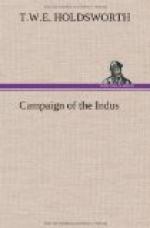Thursday, Jan. 24.—In consequence of our being so much in advance, our “rouse” did not sound till six o’clock this morning, and we did not march off our ground till seven. After we had marched about two miles; we halted and piled arms, to enable the cavalry, &c., in our rear to pass on, and thus we had a very good review of them: they marched in the same order as yesterday, except that in addition, and near to the light cavalry, came Cunningham’s horse from Poonah: this was the first time we had seen them; they made a very splendid appearance, about 600 strong, and well equipped in every respect; their dress and accoutrements the same as the Cutch Horse, (of which I gave you a description in my last,) with the difference of wearing yellow and red instead of green and red. We had a very pleasant march this day, except the latter part, which was exceedingly dusty; some very pretty and romantic scenery, consisting of ruined forts, abrupt hills, large rocks, interspersed with some beautiful lakes here and there. We reached our encamping ground rather late—half-past eleven o’clock—lost my breakfast, owing to my native groom, who carried some stock for me, and to whom I had given directions to wait by the regiment till they had piled arms and were dismissed, having disobeyed my orders, and cut off with my tatter to the river, about three miles off: gave chase directly the parade was dismissed, and walked through a shikargur to the river, but could not find the rascal. I had, however, a good view of the Indus, which does not here appear to be very broad: a cruel hot day; and, in addition to my other misfortunes, was nearly stifled by the clouds of dust raised by cavalry of every description leading their horses to water. On my return to camp I luckily found my baggage arrived, and had a good snoose till six o’clock, mess time; heard at mess that the Ameers had agreed to all our terms, and would do everything to assist our passage through their country; that we were to march straight to Shikarpoor, without halting at Hydrabad; after remaining at which place for some time, we should advance upon Candahar,—all fudge. Our position this halt was about the centre of the army,—bad encamping ground,—very dusty.
Friday, 25th.—Left our encampment at six, in the same order as before; our out-lying picket, under Stisted, joined us near our first halt, about three miles. Warlike news,—the Ameers had rejected our treaty, and that a force of 10,000 Beloochees had crossed the river; and would probably give us some trouble. Stisted had received orders to keep a very sharp look-out with his picket, as there was a chance of its being attacked: Jephson joined, with news from Sir J. Keane, that there was every chance of our being attacked on the line of march; however, we were not, although we passed over some very pretty ground for a battle. Marched into our encamping ground about half-past ten, near a half-ruined village called Jarruk, on the banks




